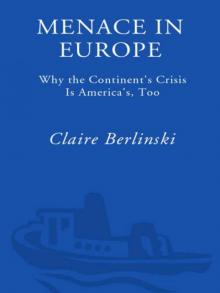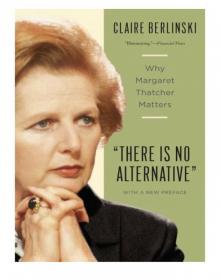- Home
- Claire Berlinski
There is No Alternative Page 11
There is No Alternative Read online
Page 11
Miranda is too charitable to dwell for long on these memories. “She was devoted to Denis,” she adds. “She adored him—”
“Yes, yes—” John nods vigorously.
“She was delightful. Now, you would expect someone like that to have a henpecked husband, who she was always telling what to do. Not a bit of it! She was very, very considerate and sweet to him. Really delightful.”
“Did she have a sense of humor?” I ask.
“She did,” says John, “but it only showed up every now and then . . . the only time I remember making her laugh was when we were sitting in the long library at Chequers, trying to write a speech. And there’d been a great scandal about a Labour shadow minister who’d been caught up in some enormous affair with a married woman, which had upset his political career, and there was a picture of him at an air display at Farnborough sitting next to the queen.” John begins laughing—in fact, he begins laughing so hard that the next part of his story is unintelligible. “And of course there was the implication of all journalism, that, you know, he’d been shagging this bird, and was absolutely . . .” Now they are both doubled over with laughter. I have no idea what’s so funny. “And I was there with the paper, saying, you know, ‘This man must go!’ And she absolutely fell about! And I remember her being fairly obvious and saying he needed a quick forty winks, you know! And to my astonishment—she really thought that was funny!”
This photograph of Denis and Margaret Thatcher immediately puts me in mind of columnist Julie Burchill’s wonderful description of their marriage: “Denis was so supremely self-confident/drunk that he didn’t give a fig about being seen as an alpha woman’s consort; with the quiet, amused, ceaseless tolerance of the little woman’s little ways typical of the real man, he was a tower of strength disguised as a bumbling buffoon—never the cretinous yes-man caricature portrayed by some weird lefties who, while paying lip service to feminism, seemed decidedly uncomfortable at the sight of a man walking behind a woman.” (Courtesy of the family of Srdja Djukanovic)
I later listened to this part of the transcript several times, trying to figure out what he was talking about. I’m still not sure. Perhaps you had to be there.
“Yes,” says Miranda, “she quite liked—”
“Slightly raunchy humor,” he finishes for her.
“Yes, she quite liked raunchy humor with the boys, but again, would never have done with women!”
“No!” he agrees.
“You know, she loved to be thought of as one of the boys, making slightly risqué jokes—”
They are enjoying these memories. As they finish each other’s sentences, their eyes meet and sparkle with affection. One can never know what another couple’s marriage is really like, but they certainly give the impression that theirs is the very ideal of what marriage ought to be. This, I think, must be why Miranda is so sanguine about the prime minister’s rudeness to her: Only a very well-loved woman could be so charitable.
Margaret Thatcher may have liked to think of herself as one of the boys. The boys, I gather, did not quite think of her as one of them. But one of the men—that’s another story. “Reagan, Gorbachev, and Thatcher,” says John, “that triumvirate—just amazing. She could just walk the world stage by then, looking like a million dollars, with a fur hat on, in Warsaw, through the snow, and we thought—this woman was a star! And not only that, but unlike the French people, her economy isn’t in trouble. You know, her economy, now everyone is looking to it, saying, ‘Perhaps this is the way we should do things!’ And now here she is, saying, ‘This is the way the West has got to deal with the Soviets!’”
The footage of Thatcher in Poland is indeed unforgettable.79 In 1988, as the Polish economy was collapsing and the Solidarity movement was gaining strength, Prime Minister Wojciech Jaruzelski invited Thatcher to visit Poland. He was presumably hoping to enlist the support of the woman who had vanquished her unions in Britain; perhaps he expected a cozy tête-à-tête, one union-crusher to another.80 He was to be severely disappointed. As a condition of her visit, Mrs. Thatcher demanded the communist government allow her to meet Solidarity leader Lech Walesa. They agreed. “You didn’t say no to Mrs. Thatcher,” Lech Walesa recalled. “No one refused her.”81
She sailed into the Lenin shipyard at Gdansk aboard a small ship. The docks were lined with vast throngs of shipyard workers dressed in their drab, oil-stained, Soviet-regulation boiler suits. Defying the police blockade, they climbed the gates and clambered atop the cranes and roofs surrounding the shipyards to catch a glimpse of her. In the video footage she seems literally to be casting light upon the grayness: It is almost as if she has been shot in Technicolor against a black-and-white background. Before the great crowds she passes, slowly, regally. The men and women in the crowd wave and wave and peer at her with hopeful reverence; they chant “Solidarność! Solidarność!” and “Vivat Thatcher!”
She lays a wreath at the monument to shipyard workers killed in 1970 by the security forces. The crowds roar as she addresses them: “Solidarity was, is, and will be!” “Thatcher! Thatcher!” “Send the Reds to Siberia!” Solidarity workers escort her to a packed church. There the entire congregation—faces cragged and careworn—begins, in unison, to sing the Solidarity anthem. The camera focuses on Thatcher’s face. Her eyes are filled with tears.
It was at this point, I imagine, that Jaruzelski realized, his head sinking into his hands with horror, that he was completely and utterly finished.
Thinking of that scene, I remark to John and Miranda, “It’s a very strange thing, political charisma. It’s fascinating to try to understand what it is, and how it works—”
“Fascinating,” Miranda agrees. “And you do feel this ability of certain people to transmit it—it is a kind of magical thing.”
She had that magic, no doubt. But in the end, they both agree, there was something more than charisma at work. She had guts. John remembers the way she rose to the occasion on October 12, 1984, when an IRA bomb blasted apart the Brighton Grand Hotel. Thatcher and the members of her cabinet were staying there before the opening of the Conservative Party conference. The prime minister and her husband narrowly escaped injury, but five of her friends were killed. Margaret Tebbit, the wife of her cabinet minister Norman Tebbit, was paralyzed.
The bomb went off at 2:54 a.m. The prime minister was—as usual—awake and working on her speech for the next day. “The air was full of thick cement dust,” she recalls in her memoirs. “It was in my mouth and covered my clothes as I clambered over discarded belongings and broken furniture towards the back entrance of the hotel.”82 She was taken to the police station, where she changed from her nightclothes into a navy suit. Her friends and colleagues arrived, suggesting she return to Number 10. “No,” she said. “I am staying.”83 Then—and this is the detail that makes you realize that this woman is not like you and not like me—she lay down and took a short nap, so to be fresh for the long day ahead of her. After she woke she took breakfast, she recalls, with plenty of black coffee.
Hours after surviving an assassination attempt, she walked into the conference center at 9:30 a.m., precisely on time. She delivered her speech, partly ad-libbed. “The bomb attack,” she began,. . . was an attempt not only to disrupt and terminate our conference. It was an attempt to cripple Her Majesty’s democratically elected Government. That is the scale of the outrage in which we have all shared. And the fact that we are gathered here now—shocked, but composed and determined—is a sign not only that this attack has failed, but that all attempts to destroy democracy by terrorism will fail.84
With that said, she proceeded briskly to defend her government’s economic policies.
The weekend following, she described the event thus: “We picked ourselves up and sorted ourselves out as all good British people do, and I thought, let us stand together, for we are British.”85 If anyone was in doubt before this that she could walk the walk as well as she talked the talk, they were not now.
“I remember
writing to her afterwards,” recalls John, “saying what an appalling thing it was and how absolutely right she’d been to just let it have no effect at all. And she wrote the most marvelous letter back, I mean, full of sort of ranting and raving about, ‘The forces against democracy must never be allowed to triumph,’ and that sort of thing. But it was absolutely from the heart. And I think again and again one finds, all the time, that the one thing that people know—was there was this absolute lion heart. Courage. It really was there.”
Miranda nods. This is why she would have done anything for a woman who showed not a bit of graciousness to her.
Even Thatcher’s detractors concede her courage. Her charisma, on the other hand, was not a universal emollient. However powerfully it affected her admirers, it was incomprehensible to her adversaries. Bill Clinton’s sworn enemies will usually admit, grudgingly, that there is something charming about the man. Not Thatcher’s. Kinnock’s views are typical.
CB: Did you like Margaret at all?
NK: No. [Emphatic and cold]
CB: I see. You really didn’t like her personally.
NK: No. She didn’t like me, and I didn’t like her.
CB: If you had met her in another context, a social context, not a political context, what kind of reaction do you think you might have had to her?
NK: Same as most other people.
CB: Which was?
NK: That she was cold, arrogant, patronizing, snobbish—
CB: Do you have an anecdote . . . can you tell me about something she said that would really bring that alive for me?
NK: In the week of the Lockerbie disaster, the terrorist sabotage of the 747, quite naturally both she and I went to the memorial service that was held in the village of Lockerbie. And at the service, we went into the church hall to meet the bereaved relatives. And of course there were United States citizens and British, one or two others, but they were the main passengers on the 747. And she said to me, very unusually, “Would you be good enough to come in with me.” Because we’d been to several memorial occasions, and she generally tended to sort of stay apart. Which suited me fine. So I went in with her. She walked up to a group of black Americans. I would say probably servicemen’s families—
CB:—yeah, a lot of servicemen—
NK:—six or seven of them. And she sort of walked up to them, and put her head to one side, which was quite characteristic of her, and said [absolutely perfect imitation of MT’s voice] “And how many did you lose.” [Snorts in disgust] I mean, these people didn’t know what the hell she was talking about. Maybe it was her accent. But I was shocked to my roots. I mean, of all the opening questions—how many did you lose? When the hairy free enterprise—
CB: I’m sorry, which enterprise?
NK: There was a ship, a ferry, called the Herald of Free Enterprise, which was coming out of Zeebrugge harbor in Belgium, and the cargo, the hold doors were opened as the ship started to move, the water came in and the ship rolled over, and 150 people were killed, including several of the crew of the ferry. We went to the memorial which was held in Canterbury Cathedral, down in southeast England near to Dover. And after the service the clergy sent everybody, the grieving relatives and everybody else, down to the crypt of the church for tea, or brandy if we wanted it. And of course, quite naturally, quite a lot of the survivors from the crew, family, working-class people, lit cigarettes. Absolutely naturally. None of the clergy turned their heads. They didn’t even notice it was happening, they were busy going around comforting people. And I was about two yards away from Margaret Thatcher, talking to people—my wife is from a seafaring family, so we have a natural empathy with these sorts of people on these occasions. Thatcher went up and told them [voice rises, scolding, mimicking her voice, uncannily accurate], “You shouldn’t be smoking in here!”
CB: Oh, my God!
NK: “This is consecrated grrrround. You should put those cigarettes out!”
CB: Oh, God, that’s a very telling anecdote. Do you have more like that?
NK: Yeah, yeah. Lots of them. Lots of them—but I’ve gone far enough. I tell you why. Because these were very, very somber, very sad occasions. I’ll only repeat those two. But they’re only a sample. Sadly. To show that she just had no social skills in those circumstances—
CB: But, come on, how could she have been as successful a politician as she was with no social skills ? Surely you must have also seen a different side of her, a charming side—
NK: No. [Icy]
CB: Never?
NK: No. [Emphatic]
CB: You don’t remember any moment when you thought, “Oh, that’s her charm. That must be it.”
NK: No. [Emphatic. A long, cold silence]
Back now to Charles Powell, in his Georgian mansion on Queen Anne’s Gate. It is late in the afternoon, post-prandial, dozy. The weather is muggy. The air is still. Powell’s hands remain folded in his lap, and I suspect that he rather wishes I were not there so that he might shut the door, tell his secretary to hold his calls, stretch out for a few minutes on the sofa, and close his eyes. Thatcher, from her picture frame, surveys the scene with what seems by contrast an almost lunatic vitality. “Is a personality like hers a freak of nature,” I ask him, “or do you think there was something in her background that created this phenomenon?”
“It’s a very good question, and one I’ve never been able to answer. Because it’s quite clear there was this enormous change of gear, that up until 1974, ’75, she had been a talented, able, hardworking, but not particularly distinguished member of a couple of Conservative governments, and a bright young sort of political candidate. Something between 1975 and 1978–9 changed her from that, into being somebody who dug deep into herself and really thought, ‘Look, this can’t go on, I’m going to change it, and I’ve got the willpower to do it.’ I don’t know how this sort of Pauline conversion really happened, but it did. Now, some of it was certainly under the influence of Keith Joseph, but something really changed in her character in that time. Did it have roots? Yes, of course it did, it had roots from her upbringing and her father, you know, the sort of Methodist insistence on the virtues of hard work, improving herself, getting herself up from a sort of grammar school girl, pretty undistinguished little town in the Midlands—”
“If you were to just speculate, wildly, about what might have happened between 1975 and 1979, what do you think might have happened?”
“Well, part of it was the depth of Britain’s condition by that time. I mean, in the latter years of the Macmillan government when she was having her first years on the job you could conclude that Britain wasn’t too bad of a place, I mean, you remember the slogan ‘You’ve never had it so good,’ the slogan on which Macmillan went into the ’57 election. But in the early ’70s we were beyond all that, that was certainly an important part of it, but what else changed it—I just don’t know, it’s almost insane . . . a vision, some sort of lightning striking from heaven, but there was something. Something happened there. I mean, she herself claims, really, she just was forced finally to think why earlier Conservative governments had failed. But I’ve never been able to explain this. I remember when reviewing her autobiography, I identified this as the greatest mystery about her, really.”
“As have I,” I agree. “I find myself confronted with statements she made such as, ‘I knew I was the only one who could do it,’ and the question I keep coming back to is, how on earth does anyone, anyone have that kind of self-confidence, no less a woman, at that time, of her background—”
“Yes, well, people do, I suppose. Stalin had it—”
“And people ask the same questions about Stalin—”
“Yes, yes. Is it nature? Of course, it helped, I think, the other factors in her character. She could never see two sides of a question. There was only one side of a question, as far as she was concerned. I mean, most of us are reasonable people, we can see the pros and the cons, but she was not the slightest bit interested in the cons, she—this is the w
ay it was going to be done, and don’t worry about the arguments against it, this is the way. Now, of course it makes you very vulnerable if you’re wrong, but she was right an awful lot of the time, and therefore her self-belief grew to vast proportions, and in the end of course it was part of her downfall. She’d become clearly imperial, by the end. You could say it’s a weakness, but it can be a great strength, politically, too, especially in crisis.”
“Do you remember ever seeing her in a moment of profound doubt? Ever?”
He pauses for quite some time. “No, I don’t think I do. Not profound doubt. Profound doubt about whether she was going to get through, not because she was wrong, but were the odds stacked against her too much? I think you can say, certainly in the early days of the government, on the economy, I think she probably felt that—I think she had some moments of doubt. Certainly on the Falklands conflict, when she took on the extraordinary task of sending out the expeditionary force 8,000 miles—”
“Doubt, or anxiety?”
“Well, doubt, too, I think. Yeah, anxiety, certainly, she got very nervous before big speeches, terrible business trying to keep her sedated, as it were, before she went on stage. She was always convinced at the last moment that she had the wrong text, or it wasn’t going to work, or whatever, but that was just a way of pumping up the adrenaline. Lots of fine opera singers, or whatever, suffer the same phenomenon.”

 Lion Eyes
Lion Eyes Menace in Europe: Why the Continent's Crisis Is America's, Too
Menace in Europe: Why the Continent's Crisis Is America's, Too Loose Lips
Loose Lips There is No Alternative
There is No Alternative